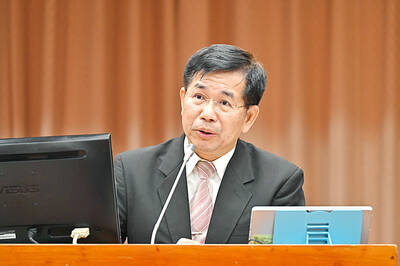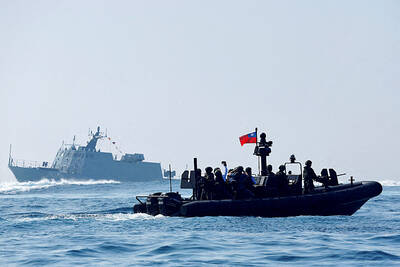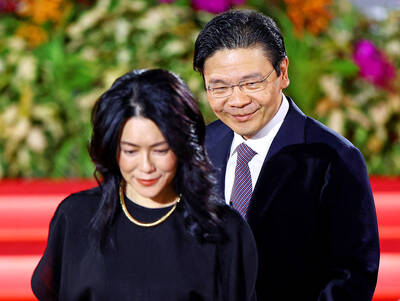China yesterday declined to provide details about the detention of an Australian journalist working as an anchor for state TV who has been detained for at least two weeks without charge.
Cheng Lei (成蕾), an anchor for CGTN, China’s English-language state broadcaster, has been held since at least Aug. 14, but Australian diplomats say Beijing has given no reason for her detention.
Chinese Ministry of Foreign Affairs spokeswoman Hua Chunying (華春瑩) batted away questions over the fate of the China-born journalist, who enjoyed a high profile as a business news presenter on CGTN.

Photo: AP
“I can’t give you any specifics,” Hua told reporters.
“But you know China is a country governed by law... We will handle things according to the law,” she said.
Cheng’s case is the latest to fray relations between Beijing and Canberra, which have withered over trade, security concerns about Chinese tech and Australia’s push for a probe into the origins of the COVID-19 pandemic.
Cheng has not been seen in public since being held, although Australian envoys in Beijing were able to speak to her on Thursday last week.
There are fears she could face a prolonged period of detention after reports in Australian media said she was being held under “residential surveillance.”
“Our concerns for Ms Cheng are genuine and real,” Australian Minister for Trade, Tourism and Investment Simon Birmingham told ABC News yesterday.
Free media advocates also called for full information on her case.
Chinese authorities should “disclose their reasons for holding” her or “release her immediately,” the Committee to Protect Journalists said, calling China the “world’s leading jailer of journalists.”
The detention of Cheng, who conducted interviews with international CEOs for CGTN’s Global Business and BizTalk shows, has also sent shockwaves through China’s foreign journalist community.
While the cause of her detention remains a mystery, she had written a number of Facebook posts critical of Chinese President Xi Jinping (習近平) and the Chinese government’s approach to the COVID-19 outbreak.
One post poked fun at Xi’s visit in March to Wuhan, the COVID-19 ground zero: “The big story today, Dear Leader’s visit, triggered titters in the newsroom — waving to a big TV screen showing the coronavirus hospital in Wuhan apparently equals a visit.”
“In China ... ‘serve the people’ goes the slogans [sic]... [the] reality is the opposite,” she wrote.
Cheng also praised on Facebook a censored interview with Ai Fen (艾芬), a doctor who sounded an early alarm about the new virus in Wuhan.
She has also spoken openly about domestic violence, including at a UN Women China event in Beijing last year.

The International Industrial Talents Education Special (INTENSE) Program to attract foreigners to study and work in Taiwan will provide scholarships and a living allowance of up to NT$440,000 per person for two years beginning in August, Minister of Education Pan Wen-chung (潘文忠) told a meeting of the legislature’s Education and Culture Committee yesterday. Pan was giving an update on the program’s implementation, a review of universities’ efforts to recruit international students and promotion of the Taiwan Huayu Bilingual Exchanges of Selected Talent (BEST) program. Each INTENSE Program student would be awarded a scholarship of up to NT$100,000 per year for up to

BASIC OPERATIONS: About half a dozen navy ships from both countries took part in the days-long exercise based on the Code for Unplanned Encounters at Sea An unpublicized joint military exercise between Taiwan and the US in the Pacific Ocean last month was carried out in accordance with an international code, the Ministry of National Defense (MND) said yesterday. According to a Reuters report citing four unnamed sources, the two nations’ navies last month conducted joint drills in the Western Pacific. The drills were not made public at the time, but “about half-a-dozen navy ships from both sides, including frigates and supply and support vessels, participated in the days-long exercises,” Reuters reported, citing the sources. The drills were designed to practice “basic” operations such as communications, refueling and resupplies,

Singapore yesterday swore in Lawrence Wong (黃循財) as the city-state’s new prime minister in a ceremony broadcast live on television after Lee Hsien Loong (李顯龍) stepped down following two decades in office. Wong, formerly deputy prime minister, was inaugurated at the Istana government office shortly after 8pm to become the second person outside the Lee family to lead the nation. “I ... do solemnly swear that I will at all times faithfully discharge my duties as prime minister according to law, and to the best of my knowledge and ability, without fear or favor, affection or ill-will. So help me God,” the

‘MONEY PIT’: The KMT’s more than NT$2 trillion infrastructure project proposals for eastern Taiwan lack professional input and financial transparency, the DPP said The Democratic Progressive Party (DPP) caucus yesterday said it would ask the Executive Yuan to raise a motion to oppose the Chinese Nationalist Party (KMT) caucus’ infrastructure proposals and prepare to file for a constitutional interpretation if the KMT-dominated legislature forces their passage. The DPP caucus described the three infrastructure plans for transportation links to eastern Taiwan proposed by the KMT as “three money pit projects” that would cost more than NT$2 trillion (US$61.72 billion). It would ask the Executive Yuan to oppose public projects that would drain state financial resources, DPP caucus secretary-general Rosalia Wu (吳思瑤) said. It would also file for